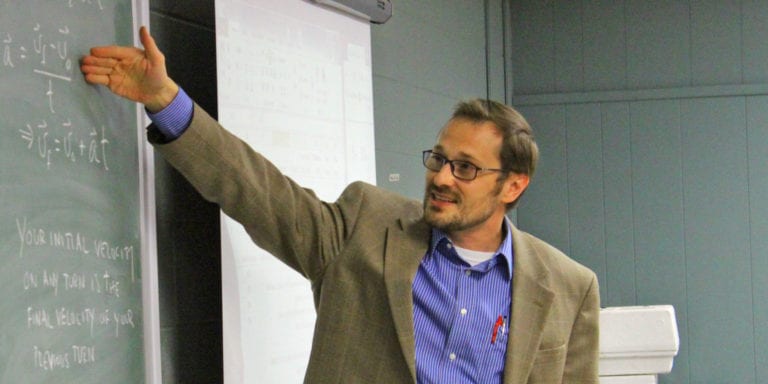by Bekah Kopp
Dr. Christopher Polachic believes in finding meaning within scientific discovery. He and his co-author argue in their new book that if a discovery has no real meaning behind it, then why should it matter?
“But how far can we press the cleverness of math in the pursuit of knowledge of a world that we can never observe directly? Does every equation provide meaningful information about physical things?” asks Polachic, assistant professor of natural science in physics at Williams Baptist University.
Polachic and Dr. Chary Rangacharyulu, professor of physics at the University of Saskatchewan, Canada, confront such questions – and more – in their newly released book, From Atoms to Higgs Boson: Voyages in Quasi-Spacetime (Jenny Stanford Publishing, 2019).
The two authors search for physical meaningfulness in theories and mathematical equations, not just interesting and clever interpretations.
Polachic and Rangacharyulu have been discussing the physical world together for over 20 years. Rangacharyulu was initially invited to write the book, and he agreed only on the terms that he could have a co-author.
Polachic said he was “honored and delighted” when his former professor asked him to fill the co-author position, noting, “We enjoyed a real synergy in thinking through the logic of our critique and building off of each other’s strengths.”
The book contains a critique of 20th century physicists’ practice of uncritically pairing abstract mathematical concepts to the usual philosophy of physical reductionism, which says the structure of physical things is always reducible to smaller parts. This, in turn, leads physicists to employ a “quasireal” description of the universe that no longer provides direct information about the real subatomic world.
The authors argue that the recent discovery of the Higgs boson may be an example of this kind of quasirealist interpretation of a mathematical theory. A multi-year experiment carried out by CERN, a physics lab in Geneva, Switzerland, concluded in 2012 that they had discovered a small bump in their data. Thus, the Higgs boson was born.
“A Higgs boson is a subatomic particle associated with the Higgs field,” Polachic said. “The Higgs field is the really important thing. In the theory, it is supposed to kind of grip onto the ripple-particles of all the other fields, thus creating the property of matter we call mass. In this picture, your mass is nothing but the interaction between the most elementary particles of your body interacting with the Higgs field.”
Polachic and Rangacharyulu suggest that a universe of non-physical entities have taken the place of the physical in much of modern physics thought, thus creating a “quasireal” picture of the microscopic universe.
The field theories that predict Higgs bosons have changed the study of particle physics. Polachic said that he and Rangacharyulu question whether “this discovery has actually taught us something important about the real physical world, or just the mathematical models of quantum field theory.”
Polachic noted that while it is not a religious book, “the discipline of physics has many important points of contact with my Christian worldview.” He dubs himself a “scientific realist,” meaning that he believes the physical universe exists and awaits discovery, whether we are willing to look for it or not. Polachic said he tries to pay attention to the original meaning of the mathematical expressions used in theoretical physics, so that he can keep from mischaracterizing the world that God has created.
Polachic urges other physicists to be “sufficiently self-critical in their own work” so that the general public can maintain trust in their research and findings. “We should be especially careful with the truth,” he added.
Polachic said he and Rangacharyulu hope their book is readable by not just professional physicists, but anyone interested in the physical world.
From Atoms to Higgs Boson: Voyages in Quasi-Spacetime (Jenny Stanford Publishing, 2019) is available from the website of the distributor, Routledge (www.routledge.com), or on Amazon.

